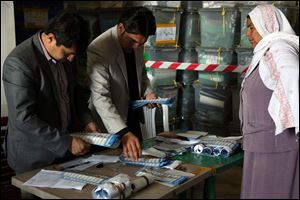
Afghanistan runoff for presidency possible
Widespread fraud complaints also may delay election tallies
4/13/2014
Afghan election workers counts ballots at a Independent Election Commission office Sunday in Kabul, Afghanistan.
KABUL, Afghanistan — In the first official report of partial results from the Afghan presidential election, candidates Abdullah Abdullah and Ashraf Ghani appeared to be leading in a race where a runoff election seems likely, according to data released today by the Independent Election Commission.
Commission officials warned that these early results, representing 10 percent of the votes cast in 26 of Afghanistan’s 34 provinces, could change as tabulating continues.
The votes will be fully counted by April 24, and a runoff election would be held no sooner than May 28, officials have said.
The results also could be affected by widespread fraud at the polls.
The election complaints commission said today that it had received so many serious fraud complaints that it might have to extend the time needed to adjudicate them.
The commission said it had 870 incidents of fraud classified as serious enough to affect the outcome of the election.
With about half a million votes cast, Mr. Abdullah was leading with 212,312 votes, about 41.9 percent of the total, followed by Mr. Ghani, with 190,561 votes or 37.6 percent. Zalmai Rassoul, a former foreign minister, had 9.8 percent, and Abdul Rab Rasoul Sayyaf, a warlord and former member of parliament, had 5.1 percent.
Ahmad Yousuf Nuristani, the head of the election commission, warned that “these results are changeable; it is possible that one candidate is the front-runner in today’s announcement, but the next news conference may be another candidate as the front-runner.”
In addition, some votes may be disallowed.
“We are investigating fraudulent votes very carefully, and there’s a strong possibility that some of the vote will be disqualified,” Mr. Nuristani said.
Even before the results were in, the apparent losing candidates were locked in negotiations with Mr. Abdullah in an effort to form coalitions in a runoff.
Both Mr. Ghani’s and Mr. Abdullah’s campaigns had predicted that each would win at least 50 percent of the vote in the first round.
Mr. Ghani, a technocrat and a member of Afghanistan’s largest ethnic group, the Pashtuns, seemed to garner widespread support among them.
Mr. Abdullah, who is half Pashtun and half Tajik, is more closely identified with the Tajiks, who dominate in the north but are less numerous than the Pashtuns. So a Rassoul-Abdullah runoff alliance, which was among those discussed, could be potent if the two campaigns can negotiate an alliance.